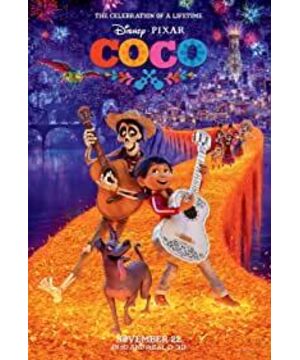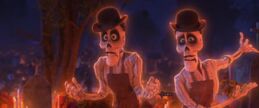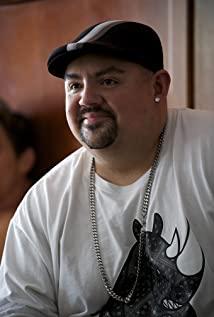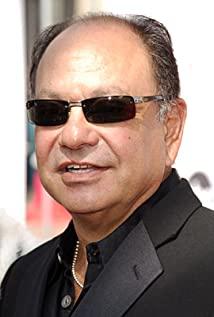I have no doubt that the same will be true of Dream Hunters. In fact, those tissues were not wasted. At the end of the movie, when the little boy called his grandmother Coco and told her not to forget his father's love, the surging affection seemed to emerge from the depths of my heart, and I cried like I was facing my grandmother. funeral.
It's been ten years since my grandmother died. In the last few years of her life, she is like the old grandmother Coco in the movie, delirious, smiling and napping in the chair all day long and basking in the sun. Sometimes we put a doll in her hand and she just held it. At the end of her life, she was like a quiet plant, sitting beside her, like sitting under an ancient tree in the deep mountains, and said nothing, it was beautiful. Occasionally I ask her if she approves of me, and she always puts on a loving look, asks who I am, and continues to bask in the sun. She was so quiet until she died. I love her.
Watching "Dream Travel", seeing Coco, I think of my grandmother. Wiping away the tears and walking out of the theater, there is still a sense of trance.
But a few days later, when I look back on the film, it is obviously different from before. I have a habit, if it is a movie I like, I usually go to the theater to watch it at least twice. I watched "Flying House" three times and "Mind" four times. I don't even want to watch "Dream" a second time. After that kind of moving like the tide receded, there was a feeling of emptiness.
Most Pixar films can be classified as "growth stories" if they are distinguished by story archetypes. That is, a key growth experience of the protagonist is the main line. The growth story must contain a certain degree of farewell, as well as looking back on the old me of yesterday, even denying, in this pain, the spirit is broken. "Flying House" is also a growth story, but the protagonist of the growth is not the fat boy, but the old grandpa. His old self withered with the death of his wife, and he lost his will to live. Modifying the flying house and trying to fly to Paradise Falls is not a happy adventure, but an elephant whose life has come to an end, returning to the depths of the jungle to end. In the movie, he experienced two abandonment of his old self. Once was the disillusionment of the childhood idol, and defeated him with his own hands; once was the fat boy who made him worry, gave up the flying house (symbolizing the grave), and returned to the world. He completed the mourning and farewell to his wife and established a new me. This is his way of growing up.
Inside Out's growth has been two-fold. Riley experienced a painful goodbye (the power of death), and after running away and returning, with the encouragement of her family's love, she accepted the pain of having a "goodbye" in her life (turning death into life). And Riley's little mind, Lele, has gone from not understanding the meaning of sadness at all, to experiencing the pain of farewell (with the pink elephant), to understand the coexistence of joys and sorrows in life. Both lines start from death (parting), cross grief, and move towards new life. The most tear-jerking thing in the movie is the sacrifice of the pink elephant, who, for Riley, voluntarily stayed in the abyss of oblivion and disappeared with the wind. The audience who saw this scene, although they would cry bitterly, would silently accept from the bottom of their hearts that death is actually a part of life. Yesterday's death in order to achieve tomorrow's life, as a human being, must also face death and say goodbye. Riley and Lele have grown through this transformation, and this two-line, inside-out narrative is so beautiful.
These two films are actually talking about how people face death. The story of "Flying House" is about accepting bereavement and disillusionment, living and embracing others. "Mind" is about accepting parting and childhood forever, facing sadness and moving on. Both are so warm and powerful. So, does "Dream Pursuit" tell people to face death and move from death to new life? On the contrary, "In Search of Dreams" tells a story of how human beings refuse to die. An "anti-growth" story.
The world setting of "Dream Travel" is related to death. The director constructed a complete post-mortem world, an exotic world that is indistinguishable from the world of the living. It is like a carnival city. After being freed from the shackles of the flesh, the energy and power for the soul to survive here comes from the mourning of the living. As long as there are people in the family who pay homage to their ancestors and make offerings to their ancestors on the altar, they can live here forever, and every year on the Day of the Dead (similar to the Chinese Mid-Autumn Festival), they walk across the flower bridge and return to the world. If the descendants of the world forget their ancestors, they will truly "die" and disappear completely. The little boy MiG strays into the world of the dead. According to the plot, he can return to the world of the living as long as he receives the blessing of his ancestors. Ancestors need their children to pay homage to be immortal, and children need their ancestors’ blessings to return to the sun. Here, the power of life and death is entangled. This raises the first question: what is the real power of "life" in the worldview of this movie?
The contradictions of the entire film are built on MiG's dream. Because of the tragedy of his ancestors, his family strictly forbids people to touch music, not to listen, not to sing, not to think. But MiG's dream was to become a musician. He could only play the piano secretly in the dark room. In the undead world, in order to get the blessing of his ancestors, he must also accept the request of his ancestors - he is not allowed to touch music after returning. If the dream is regarded as a "life" force, then the movie tells you from the beginning that the family can make you "die", and the family has the power to kill the dream of the child. This overriding parental authority actually permeates the entire film and is not logically resolved in the end. MiG even promised to return to the world on the condition that he would never touch music in order to allow his great-grandfather's soul to "live". He is willing to sacrifice his own dreams, and exchange his "death" for the "life" of his ancestors.
Fortunately for him, his ancestors took the initiative to lift the music ban because they solved the misunderstanding a hundred years ago. It was because of the grace and permission of his ancestors that MiG was reborn unconditionally and finally played his beloved guitar. The ending of this story is happy, but weak. The second question is: why is family power unshakable, and is it dissolved in the logic of the story?
Both questions above and below point to the same thing - if the family wants a child to die, how is he going to live. The story is no longer the protagonist facing an external death, but the protagonist himself dying. This is not an assumption on paper. In reality, although there are very few parents who want to kill their children physically, it is common to overwhelm them mentally. Not allowing children to pursue their dreams is a spiritual "death". The movie tells the audience that this is not right, the family should not stop MiG from playing music, but the key to resolving the contradiction it shows is not MiG's own spirit of resistance, but the solution of a misunderstanding. Because the ban was automatically lifted, MiG naturally did not need to resist. In fact, his adventure is an escape, he wants to find another supportive ancestor to solve the problem, but he does not experience real growth. He did not face true "death".
Even, he didn't really experience the disillusionment of his childhood idol (a very crucial part in the growth story), strictly speaking, his idol just changed from person A to person B.
The third question is: If the world of the dead is still full of flowers and laughter, concerts of thousands of people, luxury entertainment cities (and even slums), can this kind of death still be called "death"?
Obviously, no. Because the director also set up a kind of death that is close to the concept of human beings-to be forgotten. Like the little fan elephants who disappeared with the wind in the abyss of memory in "Mind", the forgotten souls are really "dead", they perish, they do not exist at all. And the director's attitude towards this real death is undisguised - it is tragic, pitiful, meaningless, and should be tried to save.
As a result, the ancestors of the MiG family will never die again. They live happily in the City of Joy of the Undead through the memorial service of their children and grandchildren. It's not so much a dead zone, it's a luxury nursing home. With remittances from children and grandchildren, the elderly live a good life and can go home for a small stay during the New Year's and holidays. Those who were abandoned by their children and grandchildren died sadly. It is taboo to talk about death here, everyone longs for eternal life, and death belongs only to the losers in the slums.
Pixar's concept of life, built with two great films, quietly collapses in this film.
Nevertheless, regarding the existence of ancestors, "Dream" still contributes a beautiful thought. Ancestral spirits exist because of our thoughts. This is healing. Just like some psychotherapies, such as the German family system, lead the client to say to the deceased, "You are gone, but you will always have a place in my heart. I accept the fact that you are dead, and I will Continue your life and live it well." The undead should not be seen as a continuation of life, but as another form of existence (or non-existence). Only when we accept from the bottom of our hearts that the person we deeply love has really died and completely disappeared from this world can some kind of healing happen, and the power of "life" will germinate in the soil of "death".
And this power, in the end, will help us face our own death.
View more about Coco reviews











